#to put it in perspective if someone hasn’t watched nana
Text
shaking in anger i was posting nana earlier and wanted to caption it “can you imagine people denying they’re in love” BUT THEN I was like no that’s pretty much impossible. like it’s genuinely impossible to miss the mark on their love when all they talk about is “I feel like a teenage boy experiencing love for the first time” and all they obsess over is each other not to mention all the love songs, I digress, so, i’m over here thinking there’s NO WAY. no way people can be that stupid and as i’m scrolling now 2 hours later, i stumble across a nana post where people are deadass having deep discussions on how “they are platonic..but it’s open for interpretation” “huh, i didn’t see them as lesbians? i’m lesbian myself” WHAT? WHAT. then there’s like 50 upvotes and likes and not ONE person disagreeing? truly honestly genuinely holy fkn god give these people a brain. this isn’t even a discussion to be held. do these people watch nana with their eyes and ears closed idk
#people will ship satosugo then deny nanahachi what is this anti lesbian propaganda?#once i had an Eruri stan reblog my oost and say Eremika had too little scenes to be considered canon. read that again an ERURI STAN said it#ERURI ISNT EVEN CANON??#(i’m an Eruri stan it’s my top 3 ship)#how to they consume media? by reading the first and last oage of every chapter and skipping the content#i had enough of this with Eremika and now Nana fans wanna play dumb?#wait and Ymihisu but it’s different BECAUSE THE ENTIRE NANA MANGA IS THEM IN LOVE??? LIKE WHAT IS GOONG ON#i didnt expect to get upset over it but it mostly makes me angry how incompetent and low iq some are#to put it in perspective if someone hasn’t watched nana#it’s like arguing whether or not Luffy wants to be tbe pirate king. ‘he says he wants it but it’s rrally up to interpretation’#nana
24 notes
·
View notes
Note
Hello, I’ve weaseled my way back into the ask box for one more question for nejiten: 14. How did they first meet?
Obviously, they were on a team together, but how do you think Neji and Tenten first interacted with each other at the academy? Did 6 year old Tenten throw hands with 6 year old Neji over something he said? Was it on sight snark fests until they got to team Gai and actually had a conversation? Were they aware of each other’s existence but never interacted until team assignments gave them reason to?
You make really fun/detailed answers for this ship and I like hearing about them.
Alright you sly dog you literally caught me monologuing so enjoy 😂 ask game here!
I hadn’t thought a ton about this so I kind of had to put together who they were back then first! For Tenten, I think she’s confident and playful, outgoing, a pleasure to have in class, etc. Nana raised her tough but kind, and made sure she knew not to take shit. So for her, I think everything about Neji is “so what?” He’s sooooo cute? So what? He’s a Hyuuga which makes him mysterious and cool? So what? He’s top in their class? So what? None of this matters to her because, in the words of MIKA, his perspective on life sucks. She has better things to do with her time than spend it on someone so grumpy.
For Neji, if he’s that young, he’s just on the heels of his father passing and he hasn’t had the seal very long either, AND he doesn’t have the ability to regulate himself at this age. He can’t engage with other children—he lashes out unexpectedly, he isolates himself during play, he copes with being ostracized by developing that “I’m better than you anyway” attitude—but on the flip side, he’s “great” with adults just like all the other Hyuuga kids have ever been (very quiet, very obedient), so some of his more worrisome behavior flies under the radar. I think Iruka catches it, but his questions get dismissed because you don’t ask questions about the Hyuuga kids.
Honestly with his difficulty relating to his peers, I can see Neji being labeled “weird”by the other kids just as easily as Lee—I don’t think Tenten is an exception, at first. So when she’s put on a team with him, and Lee (weird) and Gai (WEIRD) she’s like “am I weird too??” (she is, but not the point lol). But she tries to get on with everyone, and finds she can get on well with Neji; she’d just never tried before. That awe of him that Tenten has by the chuunin exams doesn’t come until she learns about the seal—it’s awe that he’s accomplished everything he has in spite of.
ALL THIS TO SAY: their first meeting is on the first day of school. Tenten introduces herself to him just as she would anyone else, Neji introduces himself back, all seems well. But then Tenten starts talking about how excited she is for school, and what’s Neji most excited about, and I think Neji got a loooooong talk the night before about why he’s there (to learn, and that’s it, and watch how you talk) and so this poor thing just parrots back “I’m not here to socialize”. Tenten is offended, sure, but she’s also confused? “What’s that supposed to mean?” Like how is he gonna get through school and not talk to ANYONE? Neji’s shocked at her blatant disagreement (he’s not the little sassmaster we know him to be yet) but he says “we’re here to learn” and Tenten puts on the biggest little pout and is like, “fine, don’t talk to me then! See if I care!!” And stalks off. I don’t think they snark at each other all through school or anything, but just don’t really gel.
I realized halfway through writing it that this first interaction is almost exactly the same as the “we’re not friends” scene in @chaosnojutsu ‘s times gone by but I left it like this because you know what? Char is right.
Thanks for weaseling on back!!! Always welcome!! 💕
#givemeanaccountalready#nejiten#otp asks#ask game#i give detailed answers because i cannot help writing down every thought i have LMFAO#thank you!!!
20 notes
·
View notes
Note
Right now, people are speculating if tomura has lost his humanity which includes his attachment to the league now that he was awakened with his new quirk as a ‘transcendent being’. I wonder how he will interact with his team when he returns? Will he question how the heroes managed to get the jump on them? How will he react to twice’s death? To Dabi letting in a hero spy into their lair and causing this raid and twice’s death? Is the tomura we have seen grow disappeared or is he still the same?

SHIGARAKI TOMURA - A VERY HUMAN VILLAIN
People may question if Shigaraki Tomura has lost his humanity since acquiring AFO’s power, however I would like to point out that it’s a running theme in the manga for characters to frequently question the humanity of Shigaraki and see him as something less than human, or a force that only exists for evil and destruction.
However, despite the fact that the heroes and Shigaraki’s enemies insist that Shigaraki has lost his humanity, the story shows the opposite. As much as Shigaraki has changed over the course of the story, he has also stayed the same.
Shigaraki started out as a kid who wanted to be a hero who saved others, and specifically a kid who would go out of his way to play with the bullied kids. Everyone knows this by now, I would say however growing up in that household shaped Shigaraki to have core values that don’t really change no matter how much he changes as a person.

Number one, the most important thing to Shigaraki is freedom. In a childish way he sees it as the freedom to do whatever he wants, because that is how All For One influenced him.

All for One specifically told Shigaraki that being born with the power to destroy means that he should use it without restraint, and never try to hold himself back because in doing so he’ll only hurt himself. AFO tried to influence him to be an unstable manchild because that would make him more dangerous and fearsome to the general public.
However, Shigaraki’s destruction is always a response. He always destroys for a reason no matter how much he insists his destruction is completely random. One of the key themes of My Hero Academia is that in times of crisis you will remember your origin. Shigaraki’s origin is a household that oppressed him to the extent that he wasn’t allowed to become a hero. All he wanted was someone in that household to agree with him rather than deny him. He wanted people to stop telling him he was wrong.
Shigaraki values freedom, specifically freedom from oppression. Oppression that specifically denies the needs of an individual just because they disrupt society. For example, the opppression that had Himiko’s parents turn abusive on her calling her a demon child because she was born with a strange quirk.

In that way Shigaraki fights for a kind of true liberation, different from what the liberation force fights for. The Meta Liberation Army while wanting to overturn society also repeated several of society’s oppressive attitude, juding people’s worth based entirely on the strength of their quirk whereas Shigaraki is willing to accept people like Compress, and Spinner who do not have super powerful combat efficient quirks and value them just as much as all the other members from his team.

Shigaraki also knows the feelings of someone who has not been saved. He’s reflected on this several times, even as early back as his conversation with Deku. He knows that the way the current society functions, it ignores the plights of victims like him that are either too inconvenient to save.
It’s what Shigaraki says to Deku word for word: “I could hurt you right now and not a single person would come save you. They’ll all walk by and pretend it’s none of their business, because they all think a hero is going to come save them.”

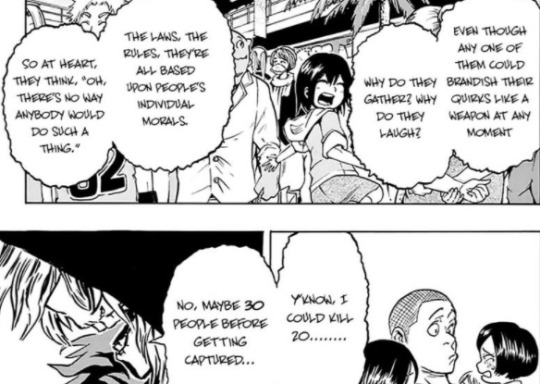
Shigaraki is willing to give people like Twice a chance, even though he was insane and his quirk no longer worked as well as it once did. Not only that, but when people make mistakes Shigaraki never throws them away. Giran is captured and ratted them out, and Shigaraki went to go save them. Twice makes a mistake and because of that Magne is killed, but rather than get angry at Twice, Shigaraki simply asks Twice to do his best to make up for his mistake, and that he’ll be doing his best alongside him.
Shigaraki understands the feelings of: “If only somebody had saved me” better than anyone else in the manga. This is something that even the kids don’t question. The kids in their complete and unwavering faith in the hero system can’t even respond to questions like “Who should you really be saving?”

Shigaraki also goes out of his way to save people even after they’ve made mistakes, or betrayed the league. Giran ratted on them and got nearly every member killed, and yet not only did Shigaraki walk right into a trap to save him, he also took special care to make sure he was alive, and rescued safely when he was in the middle of getting pounded.

The final is also somewhat of a paradox. Shigaraki has been manipulated to think that he hated his family, and wanted to kill everyone.
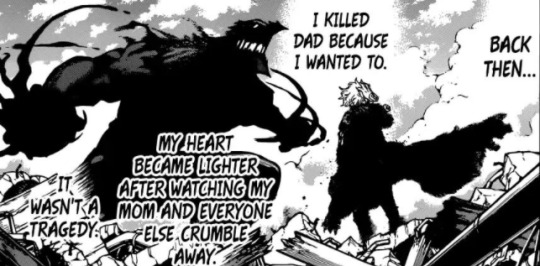
However, all of Shigaraki’s actions show the opposite. Not only does Shigaraki feel guilt for killing his family several years after the fact. Not only did he intentionally hold back his quirk at first because he was afraid of killing again. The words of his family stayed with him. Shigaraki only ever remembers his family in a mostly positive light.
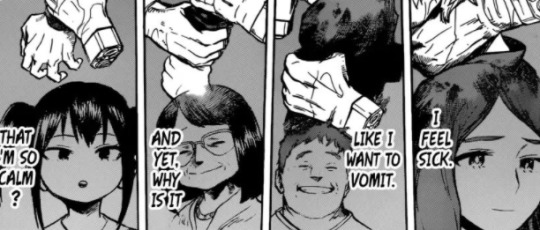


In his heart, Shigaraki holds himself accountable for what he did to his family even though it was an accident. At the same time, it’s revealed to us in his dream sequence that he already forgives his family for what transpired today, he remembers his grandparents being kind to him, he doesn’t resent his mom for just watching what his family did to him and even reassures her, he tells his sister he doesn’t care that she tattled on him anymore.
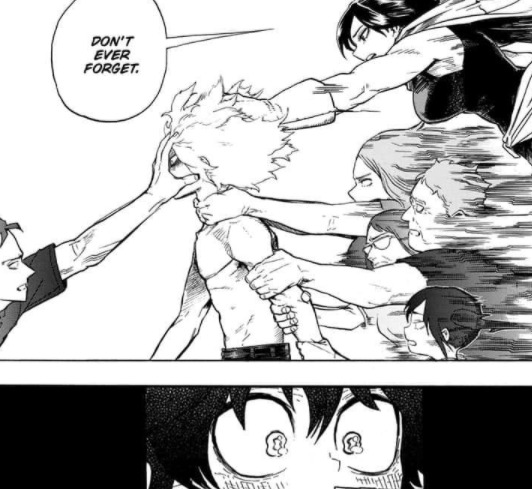
His family is someone he can never forget in both senses of the word. He doesn’t forget the times his family household was kind to him, the genuine love his mother, grandparents, and sister all showed to him, and he hasn’t really stopped mourning them ever for a single moment. He even still keeps Nana’s hand, the last hand that wasn’t broken and wears it after his so called “liberation” from his past memories of them. Yet, at the same time he doesn’t allow his family to deny who he is.
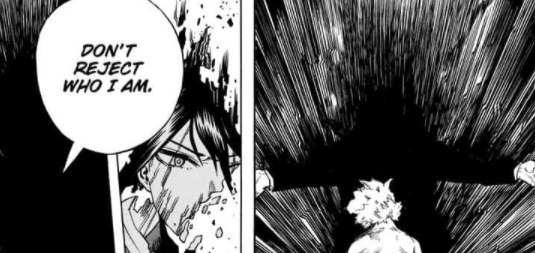
Shigaraki is someone who has been influenced by people all of ihs life, his abusive father, AFO, and then all of AFO’s constituents and the other villains he’s fought against so far. However, at the same time Shigaraki has remained the same kid throughout all of this. Always Shimura Tenko. Always the kid who wanted to play with the kids who got bullied. Always the kid resentful he didn’t get saved.
2. Shigaraki is better than what created him

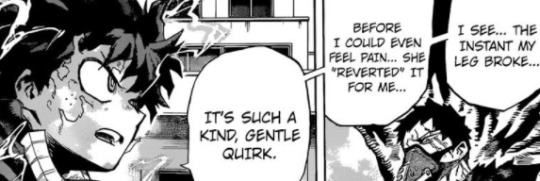
Eri is referred to as a cursed inhuman existence born only to destroy, simply because of the quirk she was born with, completely neglecting who Eri is as a person. Deku however says that just by slightly changing your perspective, you can see how kind and gentle Eri is.
Shigaraki is a character much like this. The people around him, mostly heroes always insist that he’s inhuman and again and again that he can only want destruction because of his quirk. Yet, the people closest to Shigaraki know how kind, and gentle he can be.


So we have characters like All Might, Mr. Completely Ignores Endeavor’s abuse of his own family, constantly saying that someone like Shigaraki can’t possibly have a cause for all of his destruction. Ignoring what Shigaraki says when he tells them that heroes can be violent too just like villains, their violence is just categorized differently.

Shigaraki is continually told he has no reason for wanting to destroy things, that there could be no possible motivation behind his actions. This is something that even AFO himself said, that Shigaraki simply lusted for destruction because he was born that way.
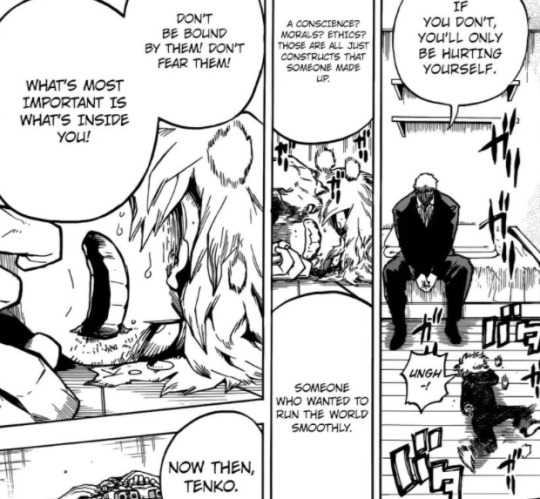
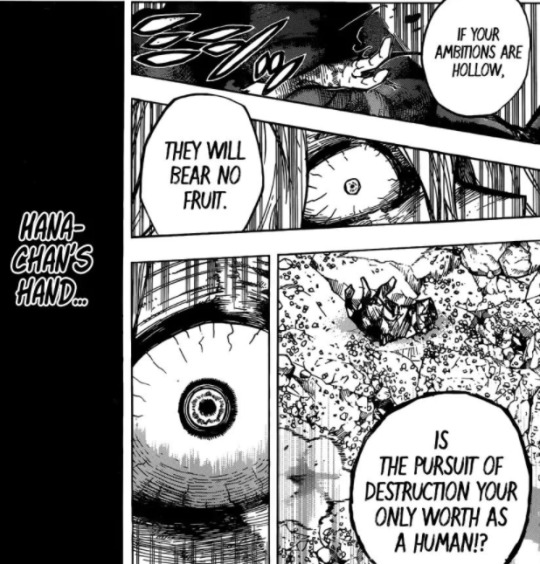
Characters insist again, that Shigaraki isn’t capable of creating anything, or achieving anything because he can only destroy. This is an identity that’s forced on him by his environment ut it’s not who he is at the center of his being. Even when he’s getting the tar beaten out of him by Re-Destro what he thinks is not that he wants to destroy, but rather that he wanted his family to tell him it was okay for him to be a hero.

So we reach the most recent chapter with someone once again asserting that Shigaraki cannot possibly want anything other than to hurt the people around him, and destroy what he can.

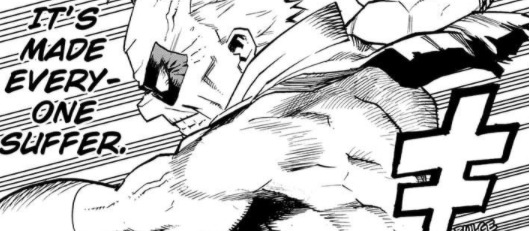

Even ENDEAVOR (lol) of all people accuses Shigaraki of not fighting for the right ideals. Yet, Shigaraki has always shown to be fighting for something.
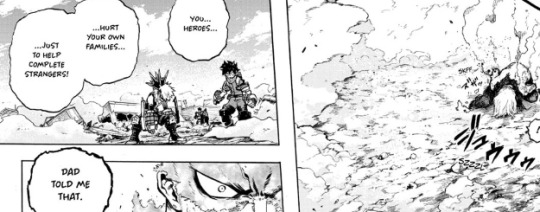
People insist that Shigaraki was just born that way, that he just wants to destroy. Yet, there are very specific environmental factors that shaped him into who he is. Shigaraki who apparently has no reasons for doing the things he does, has the longest backstory in the series (four origin chapters in total if you count Shigaraki Tomura: Distortion). Shigaraki’s line against Endeavor also implies that Shigaraki has been fighting for the same thing from the start. That he’s always had a cause, something to fight for (or maybe even just fight against) and that he simply believed what other people constantly told him.
So, no clearly the All For One quirk being given to Shigaraki has not changed who he is as a person at all. Shigaraki’s thoughts always rest with his friends and his family. Shigaraki’s first literal action upon waking up is to call Machia to his side, and protect the league. Shigaraki’s actions also saved Himiko, because if Machia had not picked her up she likely would have gone on a suicide mission.
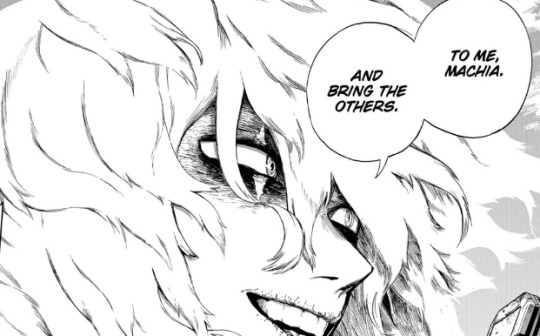
So, there is one last point I want to make: The reason the plan is going so wrong right now is precisely because Shigaraki is someone who chooses again and again to put his trust in others. First, it went wrong because not only did he allow Dabi free reign to invite whoever he wanted to the league, but he also trusted Twice with his location.

Shigaraki won’t throw Dabi out of the league for saying that he’s only here to use the league for his own benefit, because Shigaraki has always known this about Dabi and lets him work with the league anyway. Shigaraki is someone who puts his allies before themselves and gives them the freedom to be who they want to be.
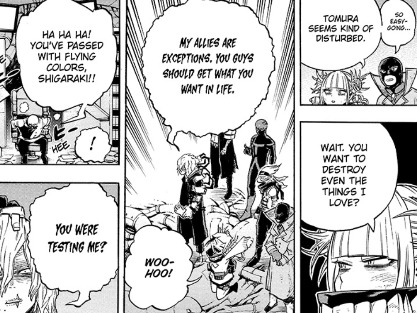

Shigaraki has said mutliple times the league can do whatever they want. He’s not really selfishly minded or motivated like AFO is. If anything, Shigaraki is much more likely to sacrifice himself, or put the group’s needs first. The Shigaraki that we’ve seen right now is the same progression of the Shigaraki we’ve always known: he fights on the front lines to draw the heroes away from his friends, he fights himself instead of needlessly risking his own allies, he needs his allies by his side.
The raid happened because of Shigaraki’s trusting nature twice. Not only because he allowed Dabi to invite Hawks to the league, but also Kurogiri’s capture and betrayal someone Shigaraki was genuinely close to and listened to for counsel led to his location at the hospital being ratted out to both Eraserhead and Mic. So it’s not Shigaraki not trusting others that led to the Hospital Raid, but rather it’s because Shigaraki chose to trust others that this is all happening.
YET, when this happened last time with Overhaul Shigaraki didn’t stop trusting others. He didn’t throw Twice out. His choice back then was to take responsibility and trust Twice even more to fix the mistake he made. Which will likely be his response again.

Shigaraki also fights against anyone who tries to control or oppress him the same way his father did once. When AFO tries to physically control his own body, he frees himself of the vestiges.
Shigaraki won’t lose his trust in other people, and won’t lose his close relationship with the league, because Shigaraki has already sustained this kind of loss before. Over and over again. He loses most of the Nomus, he loses Magne, he loses AFO. Yet, at those times when he loses these things Shigaraki’s response is always the same.
Shigaraki is struggling to be better that the environment that created him. Shigaraki’s arc is not one of him losing his humanity, but rather Shigaraki keeping his humanity in the face of constant losses.

His environment is really truly something that should have robbed him of his humanity. There are people like AFO who are out there to make him into a puppet, to rob him of all agency, and identity. Yet, Shigaraki always fights back against those trying to control him and tell him no.
Shigaraki won’t turn on the league, because his connections with the league are what make him human. It’s his connections with others he makes over and over again in the face of his extremely oppressive environment, first with Kurogiri, then with the league that allows him to stay the same at the core of who he is.
While Shigaraki is constantly dehumanized by both the hero system and the villains he fights against, he’s actually one of the most human characters in the whole series. Not only is he very sympathetic and understandable where exactly he is coming from, but he’s also always, always, always, always, struggling against a set of very human flaws.
#Anonymous#mha meta#shigaraki tomura#shimura tenko#shigaraki meta#lov meta#league of villains meta#league of villains#all for one
225 notes
·
View notes
Note
wait no sky tell me more about shigaraki redemption by spiting all for one, i beg of you
*pulling out a twenty page essay* okay-
EDIT: this theory was made before the "Shigaraki: Origin" chapters, but I still think this theory rules
So like, as a whole, in terms of “villains” the LOV is actually pretty fair game for redemption arcs if you think about it??? The latest arc shows more about delving into their characters and their motivations, and for the most part, it’s not your traditional, one-dimensional, “just wants to watch the world burn” type. For most of them, they’ve faced some kind of alienation from society, because of their quirk or other factors. And even though they’re still villains, definitely... they’re not exactly wrong to react the way they do? It’s super unfair.
Adding on that Izuku, the Main Character, was quirkless before and had to face discrimination because of that, the story could even go in a direction where you could argue that despite the fact that they’re hero and villain, (for now) they’re goal and what the want for society is the same, they just have different methods of achieving it
Now, obviously, even if the LOV all got some kind of a “redemption” arc, they wouldn’t suddenly be “buddy buddy” with all the main characters. But they don’t have to be enemies, either. There’s just no point to it???
Like think about it, at this point, what is Shigaraki’s motive? (I’m speaking as someone who’s watched the anime and has a knowledge of what happens in the manga, even if it isn’t fully complete knowledge) His motive was to kill All Might. Okay, well, All Might is retired now and doesn’t have power anymore, no longer the Symbol of Peace. Does he have any real reason to continue to target All Might? The symbol he stood for is already destroyed, So there ISN’T really a point to it anymore. Class A? He doesn’t have any good reason to attack them from here out either. Even if it’s “to weaken Hero Society” he already DID that through attacking the training camp, and so if he really wants to do more damage he should go after different things that spark different discussions, not repeat the same ones. So, now that he’s outside of All for One’s sphere of influence... he really doesn’t have any motive to keep being the overarching villain of the story.
As for redemption? It sounds crazy to think about at first, because he’s been treated as the Main Villain from the start, but when you think about it, it’s not actually all that far-fetched. Shigaraki was kidnapped and manipulated by All for One after he had an accident with his quirk, and All for One used the trauma from that event to manipulate him to the villain’s side. (It’s even been suggested that the “accident” with his quirk didn’t ever actually happen; All for One could have implanted the memory with the intent to use the manufactured trauma to manipulate him).
In a recent chapter, Shigaraki is shown having memories of his childhood, before All for One. He knows that his grandmother (Nana Shimura) was a hero, and despite the fact that he’s a villain, he says that the memory is associated with good emotions, not negative ones. If more things like this continue to happen, what if Shigaraki starts to realize that he WAS manipulated by All for One? I don’t think Shigaraki would take that lightly or be okay with that, ESPECIALLY if he knew that the only reason it happened was because of his connection to Nana; knowing that he was literally just a pawn to hurt All Might more and that that’s the only reason All for One chose him, holy hell that would make anyone mad.
That could very easily become an eventual turning point. So a redemption arc wouldn’t be out of character or come from nowhere.
As for whether or not he’s worthy of redemption? As said above, he was literally manipulated into it by All for One, so there’s that, but to go even further... he... technically actually hasn’t done anything villainous, only tried to. He set up the USJ, but even though he intended to kill All Might it didn’t happen, and at most there were two pro heroes who were badly injured, but survived. Stain was gonna do whatever he wanted to, no matter what Shigaraki did about it. He wasn’t even there at the Training Camp, but again, there were no casualties. The battle with All for One was, of course, all All for One’s doing. From what I’m aware of, he wasn’t really a fan of Overhaul much (oh hey, brain just thought of Eri and Shigaraki being parallel characters, think about that for a minute).
So it’s not like he’s done anything that’s all that unforgivable yet (like, say abusing your whole family for twenty years). Again, of course the main characters wouldn’t be “buddy buddy” with him after he attacked them twice, but They Don’t Have To Stay As Enemies??? Even in the latest villain arc, the villain’s aren’t fighting heroes.
All in all, I think that a redemption, if it was written well, wouldn’t be that bad.
From a story perspective? It would be impeccable, too. Everyone’s all about “subverting expectations” and yes this does that, but it’s even in a satisfying way too?
Shigaraki, from the start, has been painted as the series’ Main Villain. After the introduction of All for One, and it being made apparent that AfO is Shigaraki’s “Sensei”, we all collectively assumed that All for One would pass his power on to Shigaraki, truly making Shigaraki the Main Villain(TM), and then the series ends with a great battle between the two new holders of All for One and One for All; Shigaraki versus Izuku, fated showdown.
Yeah, uh, how fun would it be if they just turned that all on it’s head? I’m serious.
So, Shigaraki DOES get All for One, as it’s been set up this whole time...
And, well, you could say that this entire time the goal has been to end the conflict between All for One and One for All, for good. What I’m suggesting is that they end that... By simply choosing to not fight each other anymore. The conflict ends because Shigaraki and Izuku put a stop to it by NOT fighting.
Of course, it’s still a Shonen, so there’d have to be some kind of final battle, maybe All for One is pissed that Shigaraki has decided to go against him, maybe there’s some new villain, but the point is? The conflict between AfO and OfA ends because of a mutual choice instead of some great battle that decides the winner. Maybe they’ll never get along, but they don’t need to be enemies. It’s not what they want anymore.
Why does this work as a narrative standpoint? As I said, looking at how things have been set up so far, it could be that one of the points of the story, as a whole, is about not repeating the mistakes of the past. This has been set up through the fact that the heroes aren’t all perfect, or have pure motivations; Stain had the spotlight specifically BECAUSE the pros Messed Up(TM). And, while Bakugou isn’t as bad as Endeavor, it would be a lie to say that there isn’t any parallel between them; THE POINT of that could be that Bakugou WON’T make the mistakes that Endeavor did, thus “Not Repeating The Mistakes Of The Past”
This ties into what I said, because Shigaraki, as the new holder of AfO would also be the “new generation”. The history of AfO vs OfA no doubt hasn’t been pretty. There’s probably been many regrets. And so... putting a stop to it by Actively Choosing To Not Fight Anymore? That’s powerful, bro.
And, can you imagine? All for One chose Shigaraki to try and cause despair to All Might, but what if That Exact Move became his downfall? Also powerful, bro
Anyway, uh. Just Sell BNHA To Me Already, Please
139 notes
·
View notes
Text
Textual Analysis Final
The Visit and The Conjuring both have representation of children at points in the movies. The conjuring (2013, horror, thriller and mystery) was directed by James Wan. The production companies are New Line Cinema and The Safran Company. The plot, based on a true story from 1971. Roger and Carolyn Perron move into a dilapidated farmhouse in Harrisville, Rhode Island, with their five daughters. Their pet dog refuses to enter the house and one of the children, whilst playing a game of 'hide and clap' finds a boarded-up entrance to a cellar with help from a ghostly figure. The budget for the movie was $20,000,000. The Visit (2015, horror and thriller) was directed by M. Night Shyamalan. The production company of this film is Blumhouse Productions. Blumhouse Productions are an independant label who only produce horror genre movies. Cameras follows Becca and Tyler, two kids who go to visit their estranged grandparents. Their mother hasn't spoken to her parents in over 10 years due to a huge argument, but now the children want to meet their Nana and Pop Pop (grandfather). The budget for the movie was $5,000,000.
The first significant aspect of cinematography in The Conjuring’s ‘Hide and Clap’ scene is the use of handheld camera shots. This is almost acts as the ‘ghost’ pulling or persuading her into the bedroom where the ‘ghost’ is hiding. This was used because James Wan wanted to give that feel to the audience like someone is around the mother whilst she is looking for her daughter who is hiding as it creates more tension as the audience might know something is wrong. This is important in relation to the macro concept of representation because the use of the handheld camera clearly shows the camera always moving and this is representing how a child is giddy and always moving and never still. This is similar to an aspect of cinematography in the sequence from The Visit, ‘Hide and Seek’, because all of this scene is made by handheld cameras as the children are recording the game of hide and seek with cameras. They are similar in the cinematography used but they are used in different ways. In The Visit the handheld shots show that the children are running away from the ghost or in this case their ‘Grandma’. This is important in relation to the macro concept of representation because the same reason as The Conjuring, children are known to move a lot and they never want to sit still so this hand held camera scene is a perfect example of that point.
The first significant aspect of editing in The Conjuring’s ‘Hide and Clap’ scene is the use of a slight blue tint in the image during the scene. The color blue represents isolation, and the mother is alone when in the hall because her daughter is hiding. This is important in relation to the macro concept of representation because children typically do not like to be alone/left alone at all. They are known to start crying when left alone because they get scared, and knowing the little girl in The Conjuring was on her own hiding, we could see at the end of the scene that she was not scared to be hiding on her own, but her mother was scared because she heard something from the wardrobe. This is making a contrast to the stereotype of children in normal life situations. This could have been done purposely to make people think different about children in horror films, are children becoming more dominant in horror movies rather than the usual weak and vulnerable child we see in many horror movies. This is similar to an aspect of editing in the sequence from The Visit because when they are playing hide and seek we see that they separate so they are on their own under the house. When they realize that their ‘grandma’ is chasing them in a weird way, they start to get scared and they try to run away. This is important in relation to the macro concept of representation because this is used as the opposite to The Conjuring because the children in this scene are scared and are seen as the more weak and vulnerable children. We clearly see them scared and running away from the subject that is scaring them and they also look like they want to cry. Two movies using the same way to convey how children react to horror is interesting because the way a blue tint in The conjuring tells us that the mother is scared and the child is not, but in The Visit, the blue tint shows us that the children are scared to be on their own with the ‘grandmother’ yet the ‘grandmother’ is not scared to be alone under the house.
The first significant aspect of mise-en-scene is lots of dark wooden objects such as the stairs, furniture in the landing which convey danger as darker colors are more associated with the nighttime and danger. and especially the wardrobe which is really important.This is important in relation to the macro concept of representation because this we see dark wardrobes in a lot of movies including The Lion and the Witch and the Wardrobe. There is a link between these movies as in The Lion and the Witch and the Wardrobe, the wardrobe has a world behind it and the children go into the wardrobe to find it. But the way they find it is significant and it is by playing the childhood game, Hide and Seek. The link is there because The Conjuring is using the same idea but with the ‘ghost’ inside the wardrobe. This is similar to an aspect of mise-en-scene in The Visit with the furniture being all one color, but in The Visit, everything is white or a bright color. This is a contrast to dark colors in The Conjuring and using bright colors makes the children feel like they are safe where they are. Also it helps the audience understand that the children are safe. But this is a fake message and they are not safe with who they are living with. But all the way through the movie we think they are fine and this because they are surrounded by bright colors. If they were surrounded by dark wood colors, I think we would have a different perspective of it. The use of the wardrobe which is dark wood means it is dangerous and significant because it is the darkest thing in the bedroom. This is important in relation to the macro concept of representation because from this we understand that children feel safer around bright colors like white, whereas they do not around dark colors like brown wood. This shows that a fake judgement can be made toward whether children are safe of not in horror movies.
The first significant aspect of sound in the sequence from The Conjuring is the use of asynchronous and foley sound of a grandfather clock and the clapping of the “hider”. The use of this sound tells the spectator that these sounds are asynchronous to put us in the mother’s perspective as she is wearing a blindfold so she cannot see but she can hear, just like us whilst watching this part of the sequence. The use of the foley sound also creates tension as she cannot see so it must be tense for her as she will be concentrating not to bump into things whilst seeking. This is important in relation to the macro concept of representation because normally the child would be the scared one to be blind folded and it would be tense for them so it is almost like the mother is trying to imitate being a child whilst playing the game of hide and clap. This is similar to an aspect of sound in the sequence from The Visit, as here M. Night Shyamalan uses asynchronous sound as we can hear both the grandparents talking and doing things outside in the back yard. The use of sound tells the spectator that because both of the children are inside the kitchen whilst on a video call with their mother, that the children are trapped in the house and are been watched and captured by the grandparents. This is important to the macro concept of representation because they’re using children to scare and capture which is a convention to horror movies as the children are usually the ones who get scared and captured.
1 note
·
View note